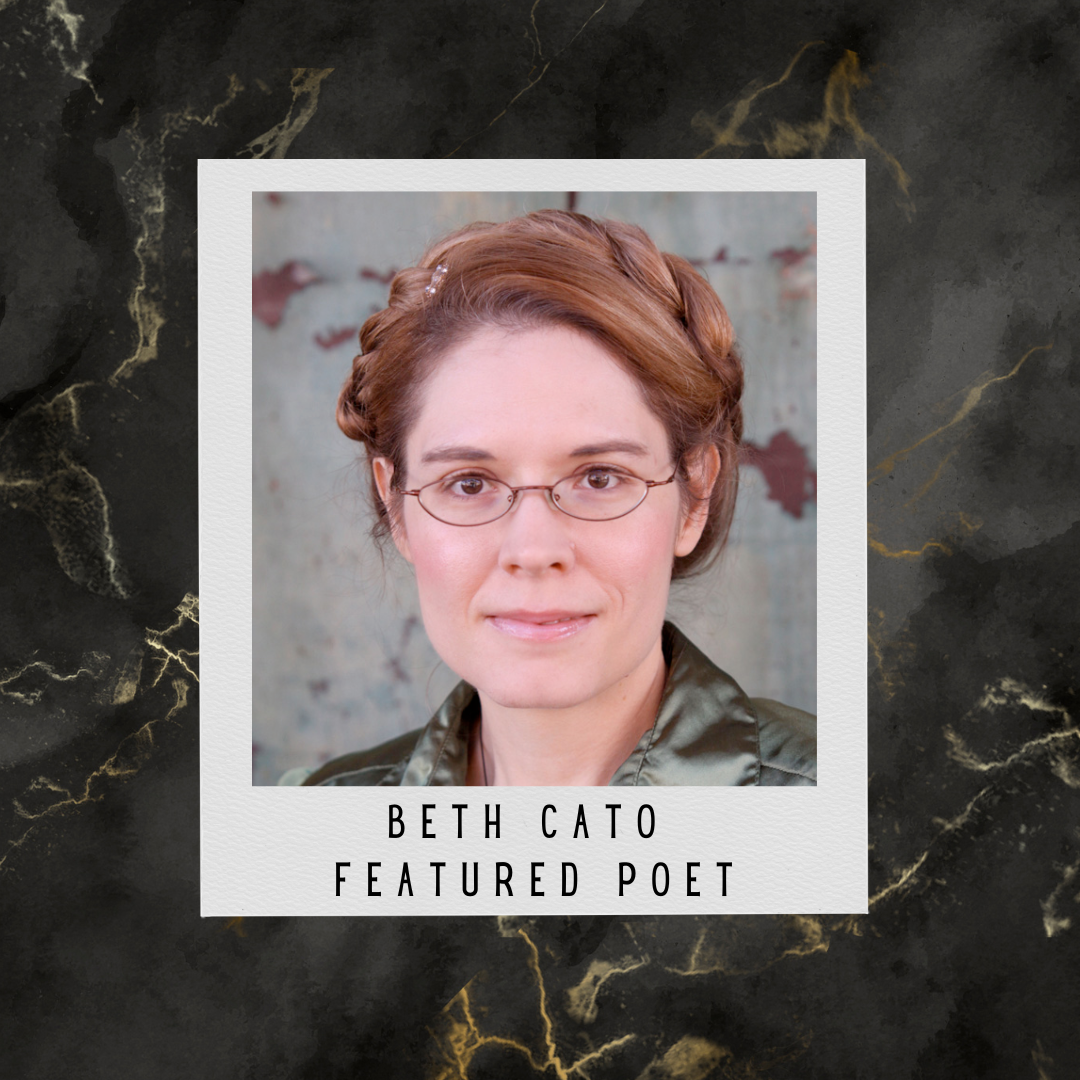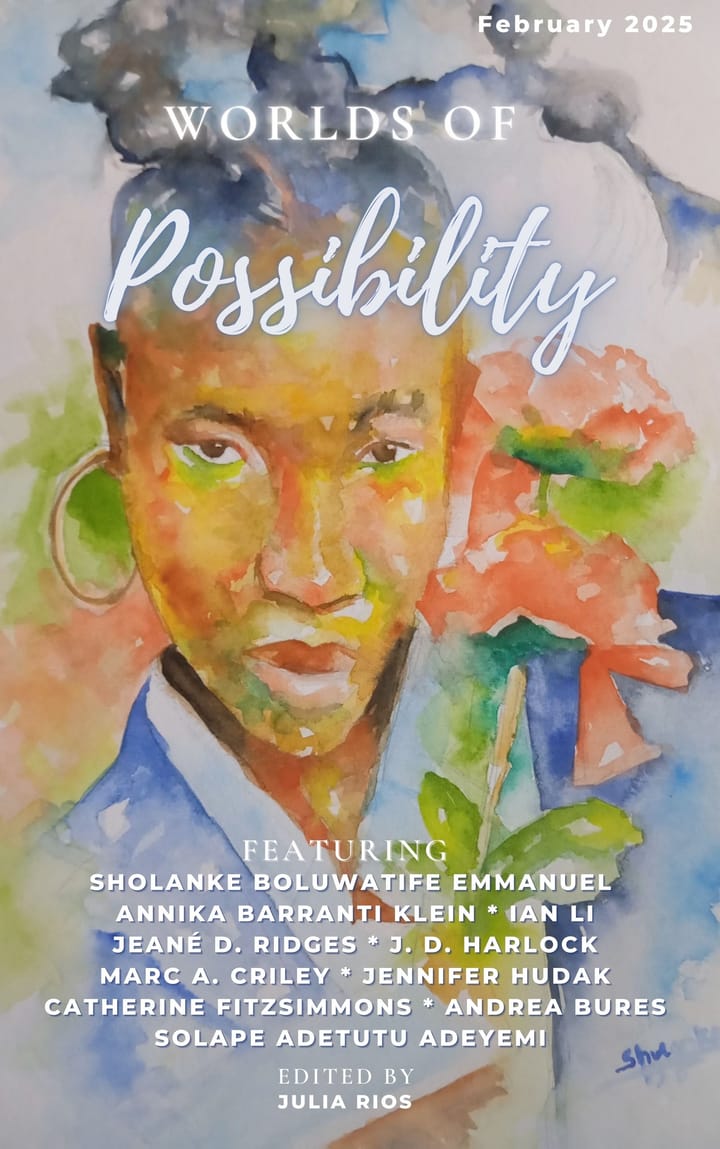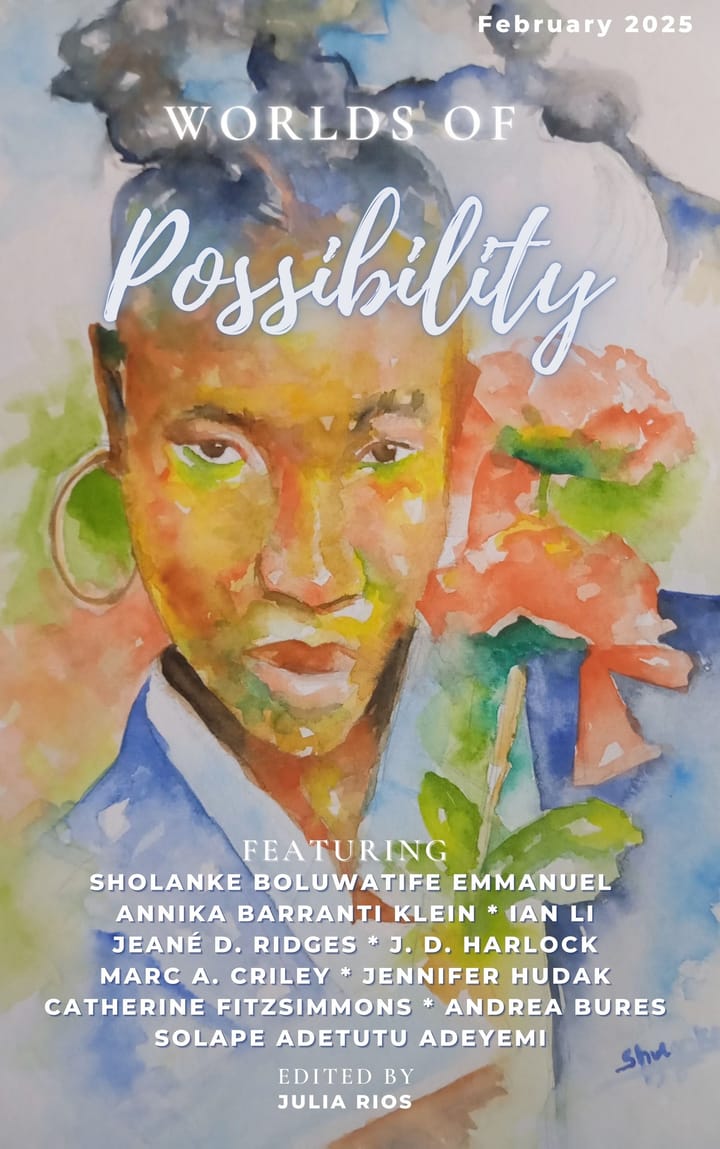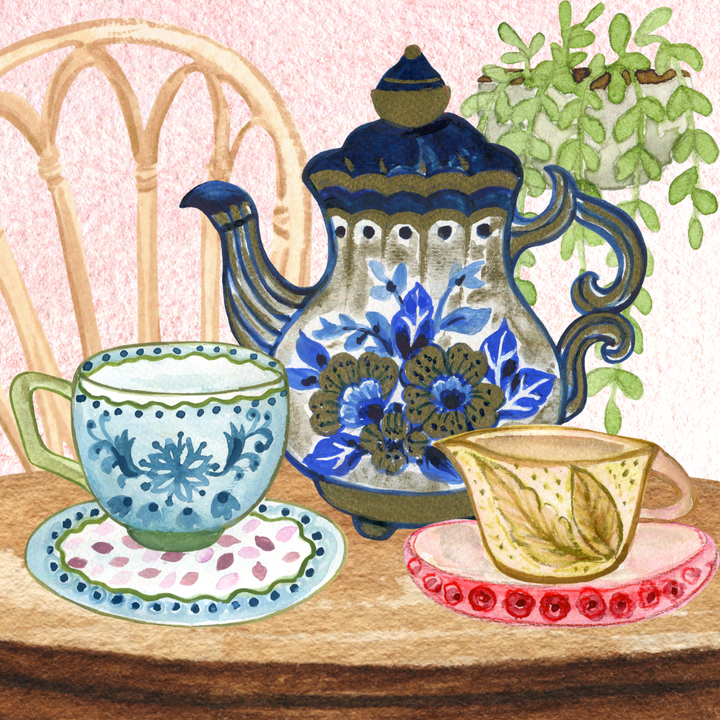Three Poems and an Interview with Featured Poet, Beth Cato
For the August 2024 issue of worlds of Possibility, we have a featured poet, who gave us three poems. Here is an interview with her about her creative process, as well as the trio of poems.

For the August 2024 issue of Worlds of Possibility, we have a featured poet, who gave us three poems. Here is an interview with her about her creative process, as well as the trio of poems. You can listen to the interview and to Beth narrating the poems on the OMG Julia podcast, and you can also read a transcript below.
Content Note: “You Are a Monster” by Beth Cato acknowledges trauma and children who need social workers.
Listen to "three poems and an interview with featured poet Beth Cato - 7:29:24, 5.49 PM" on Spreaker.
Junkyard Spaceship
by Beth Cato
building a junkyard spaceship
means
using what you got
sometimes that means you make-do
with a captain's seat that's a bit big
or a bent-up nose cone you got to hammer
for weeks to get the angles right
but it also means, at times,
things work out just fine
meaning there's a cockpit nook
the perfect size
for a cat
Defiance by Cake
by Beth Cato
some teenagers rebel by
partying and drinking,
me, I did what mama
always said not to do:
I walked up the knoll
where fairies were said
to lurk in wait of humans
to steal them away to fairyland
and not only did I go there
week after week
I carried up a hamper
to hold my own private picnic
my meals were lonely at first
not that I minded that much
the valley view was gorgeous
but in the third week
a strange man showed up
pale, willowy, with yellow eyes
like a cat
I invited him to partake
he did, reacting with surprise
to the tastiness of my meat pies
I took that as a high compliment
as I plotted larger-scale
and grander bakes
for my receptive audience
in the coming weeks, he returned
bringing along fae peers
they expressed surprise at my baking, too
to my relief, they made
no outward efforts to
lure me away
not until they offered me an opportunity
to bake for the fairy queen herself
an honor rarely granted to humans,
they said, as they dusted
biscuit crumbs from their vests and corsets
I politely declined, explaining
my goal was to be accepted as a contestant
on a major television baking show
and that everyone in my family was
on a diet or shunning gluten
so I'd had no one to experiment upon
and that I'd known from stories
that fairies were said to have
the best food across dimensions
I'd figured
if fairies enjoyed my bakes
well, I might have a chance to win
my new friends
were amused and supportive
they said they could lend magic
to my efforts
but I said no
I wanted to win by my own power
my own alchemy of sugar and spice
and on that note
would they be willing to try
a Sacher torte and opera cake
next Wednesday?
they said yes
You Are a Monster
by Beth Cato
when the other little children were
wishing to be firefighters and teachers
when they grew up
you wanted to be a monster
when your teacher said "no
becoming a monster
is a terrible career goal for a child
as kind as you"
you were more determined to
make it happen
you remained as nice as ever
as you excelled at academic work
through high school, college
when through sheer will, you grew
blue fur all over your body
two nubby gold horns framing
your forehead
your eyes wide, your lashes long
nothing about you
the slightest bit scary

you completed your doctorate
in social work, and now
you spend your days
helping children process the deeds
of the worst of monsters: humans
kids feel more at ease conversing with
someone like you
your fur soaks in their tears
and when every so often one says
they want to be a monster
when they grow up
you assure them they can be
most anything they want
but they should always
strive to be kind
About the Author
Nebula Award-nominated Beth Cato is the author of A Thousand Recipes for Revenge and A Feast for Starving Stone from 47North plus two fantasy series from Harper Voyager. She’s a Hanford, California native now moored in Red Wing, Minnesota. She usually has one or two cats in close orbit. Follow her at BethCato.com, on X/Twitter and Blue Sky at @BethCato, and Instagram as @catocatsandcheese.
About the Artist
Miyusa Ashibara is an artist from Indonesia. You can find her on instagram as @miyusa.ashibara.
Interview with Beth Cato
Julia Rios
Welcome to the OMG Julia podcast, where we discuss creative lives and processes. I'm your host, Julia Rios, and today I have with me Beth Cato, our featured poet from the August 2024 issue of Worlds of Possibility. Beth, welcome. Please tell us a little bit about yourself.
Beth Cato
Hi, Julia, it's great to talk to you. I'm Beth Cato. I was born and raised in Hanford, California, right in the middle of the state. I lived in Arizona for quite a long time, and last year I moved to Minnesota, and I'm in Red Wing in the bluff country there where I have my cats, and my orange cat, Finn, just jumped in my lap, so hopefully he won't cause too much mischief right now. And yeah, I write poetry, short stories, and I have a number of books out from different publishers.
Julia Rios
Wow, that is quite a big move from Arizona to Minnesota. How has that been for you?
Beth Cato
You know, it was beautiful. We moved last summer, and it was a good time to do it. We escaped the Phoenix area right before the the major heat kicked in and had a glorious Midwest summer and then experienced what they call the lightest winter in 150 years. So it was a great winter to be here for my introductory winter.
Julia Rios
Now, had you ever been in a place that had heavy winters before?
Beth Cato
I'd been in snow maybe five times in my life and had never driven it it in it or dealt with sub-zero temperatures at all.
Julia Rios
Wow.
Beth Cato
So it was, yeah ... even for this being a very mild non-winter, it was still a drastic change for me, especially after being in Arizona for 16 years.
Julia Rios
So big, big change. I'm glad that you had an easier winter to sort of adapt. How How did you do? How do you feel about it?
Beth Cato
I'm still nervous about the winters. I'm agoraphobic. I am a nervous driver anyway. I only really safely drive within a very small radius during the daytime. So winter driving still really terrifies me, but overall, you know, we love it here. It's gorgeous. It's green. We have about an acre of property and we're trying to revive some woodlands that have quite a few invasive plants in them. So yeah, in the summertime when the weather's been nice, that's been my life, writing during the day, and in the evenings, going out there and battling the evils of buckthorn.
Julia Rios
Wow. So you have been writing for many years at this point. And I know I've worked with you on other stories and poems in the past, both for Worlds of Possibility and other venues. I know you also have a bunch of novels. Tell me how you got started with writing.
Beth Cato
I was the weird kid – from age four, I wanted to be an author and illustrator when I grew up. And I kind of kept that dream for a number of years. I fell into the fantasy genre when I was about eleven or twelve years old, and then really wanted to be a fantasy author. And then later into my teens, I had negative influences on that: a college teacher who told me that, oh, the fantasy novel I was reading wasn't a real book. And I had a well-meaning family members who told me that by reading and writing fantasy, I was going to burn in hell. So under those kinds of pressures, I stopped reading and writing fantasy for a number of years and missed it.
And after I gave birth to my son and I was kind of home alone and I felt like my brain was rotting out, I was like, you know, for my mental health, I need to rediscover myself and I need something to really keep me going. And I decided to work on being a writer again. And I kind of started, you know, writing books again. I was told that those books really had problems. So I realized, okay, I need to start from scratch. And that's when I started working on short stories and poetry to really improve my technique. And I've kept at it for gosh, over fifteen years now, really, that I've really been making an effort at it.
Julia Rios
So for you, writing stories and poems came second and that was as a way to improve your technique so that your novels would be better.
Beth Cato
Initially, yes, and then I realized I love them both. And right now, I don't have very much time to do short stories, but I do try and keep up with the poetry.
Julia Rios
Do you find that the stories actually did help you to improve the novel technique?
Beth Cato
Absolutely. They helped me with brevity, with making every word count. Flash fiction in particular, you know, that's typically stories that are under 1,500 or a thousand words, writing for that format and making a story function with that word count was hugely beneficial for me.
Julia Rios
So you naturally would say that you tend to write long?
Beth Cato
I don't, I realized that my brain just creates stories of different lengths. It's really weird. I know I have some friends who will say they start writing a short story and it ends up being on a novella or even a novel, and I've never had that issue. When I get an idea, I tend to know, okay, this is flash, or this is a short story that's going to be maybe four or five thousand words, or no, this is definitely a book idea. And I really know that from the initial concept.
Julia Rios
Wow. So you mentioned that when you were very young, you wanted to be a writer/illustrator. Do you still do drawing?
Beth Cato
Not so much, no. I've dabbled with that a little bit into adulthood, but that's largely gone by the wayside. I think I've still done some visual arts. I did quite a bit of scrapbooking for a while, and I do some other arts projects every so often, but not nearly as much as when I was a kid, when I would make, you know, my family's Christmas gifts and start on that in July and do things like that.
Julia Rios
Wow. Okay, so writing for you, is that more work these days than an outlet of creative pleasure or is it kind of both?
Beth Cato
I think it's both. It is my primary job. I'm fortunate enough to have a husband who, who makes enough money that he can support us. And then my writing, it's icing on the cake, really. And so I'm free to write during the day. And that's, I treat it as my work, and it is, and you know, right now with book contracts, it's definitely, you know, you feel the pressure of that deadline, especially for me coming up in a couple months.
Julia Rios
Oh dear. So what do you do? Do you have like a specific routine that you follow, or do you try to get a certain word count each day? What's a typical writing day like for you?
Beth Cato
It really depends on my goals at the time. If I'm doing a rough draft novel, that is a very stress-filled process for me because I hate writing rough drafts. I hate knowing how broken they are. And I push through as quickly as I can while maintaining sanity. There have been times where I've done a book in like 25 days and done like, you know, 90,000 words. And I don't remember much about that month. It is not a healthy process for me. But right now I try and do a moderate goal of like 2,500 words a day. And then that way I can kind of get that done by early afternoon. And then I have the later part of the day to do other tasks, do grocery shopping, things like that. And and that seems to work better for me. But you know working on rough drafts is only a small portion of what I do. A lot of the times it's just really working through the day in chunks and working on editing and then switching and working on reading research materials or doing poetry submissions and just kind of breaking things into chunks. A lot of times working on my books does tend to be a morning thing. And then I use my mid afternoon or late afternoon to do other writing related tasks.
Julia Rios
Sure. Do you have a dedicated space that you use for that?
Beth Cato
Yeah, I have my own office, thank goodness. Yeah, I can't really work well around other people. I'm not one of those who could ever set up in a coffee shop or anything like that. I cannot work with people around me. ah So it works really well to have just my own office. My cats are usually hanging out nearby and I can just work. My kitchen's nearby, so if I need to putter around, get something to drink, do baking tasks, whatever, I can do that pretty easily.
Julia Rios
Yeah, so you're a big baker. We haven't really discussed that, but it kind of goes along with your "Defiance by Cake" poem. I feel like that's coming from personal experience. You do a lot of baking, and I know you post recipes sometimes online, or pictures of your bakes. Is that something that you do to sort of let off steam?
Beth Cato
Absolutely, that that's definitely another creative outlet for me. I love baking in particular and I love sharing what I bake: cookies, bars, brownies, all kinds of things like that. I just love them. I love exploring the world through flavor. Even when I travel, that's something I do. I try and seek out regional pastries or different things. And cheeses. Cheese is another big thing for me. And I kind of do cheese travel and I try and collect and keep a log of all the cheeses I try. So it's all related and it's just, it's really a way of that I take in the world.
Julia Rios
You're examining the world by taste.
Beth Cato
Yeah, and it's funny, a couple of years ago when I was ah diagnosed as an adult with autism, it really made me realize that throughout my entire life, that has really been a sensory outlet for me. It has been really experiencing the world by flavor and texture through my mouth. And I'd never thought of it that way before. And then my, the psychiatrist who diagnosed me was like, yeah, it really sounds like this is one of your, your ways of processing the world. And I was like, whoa, it was like complete light bulb moment.
Julia Rios
Yeah, I think that also the the sort of drive to keep lists of all the cheeses that you've tried is also kind of part of what I think of as autistic normative behavior.
Beth Cato
You know, it's funny, I was diagnosed with kind of the the value pack of neuroses years ago, going through, you know, depression, agoraphobia, generalized anxiety disorder, OCD, just everything. Those fit, but didn't quite go far enough. So kind of the diagnosis of being autistic makes all of those things kind of fit together like, oh, yeah, okay, now everything makes much more sense.
Julia Rios
Yeah, so do you think that your autism influences your writing, and do you think that any of your attitude toward your writing has changed since you were diagnosed?
Beth Cato
It really makes me want to write from the autistic viewpoint through characters more often and bring on authenticity to that. So that is something I'm working on with some projects right now is really using my own unique experience and writing from that, which for a number of years, since my son was diagnosed at age three, so from very young. I never felt comfortable really writing about autistic characters to a big degree because I didn't feel like I had the right representation for that. It wasn't from me. And now that I feel like I'm diagnosed, it's like, okay, yeah, I can write from that. And, you know, I'm very different from my son. We're very different people. And I think that helps give me a much more rounded viewpoint of kind of the uniqueness of what it means to be on the spectrum.
Julia Rios
Yeah. So I know that another thing that can crop up a lot with autism and also is something that neurotypical people can experience as well is burnout. And the idea that you've pushed yourself, I think it's really common for autistic people to push themselves super hard and then kind of reach the end of their rope. Has the diagnosis made you change the way that you approach writing goals or things like that?
Beth Cato
It's helped me to be more forgiving with myself in not quite, not so much the realm of writing, but with what I am capable of doing each day. I realized many years ago that having a normal person job from like nine to five and being among people all day and leaving the house to do work is a way for me to completely burn out very fast. I cannot tolerate being around people like that. And I cannot tolerate just the energy of being in a place like that. I really feel much safer at home. And that always frustrated me and made me feel like a failure because, you know, I'm an adult. Like, why can't I do this? You know, what's wrong with me? And now that I realize like, okay.
The reason why writing works for me is because I'm self-employed. I write during hours that work for me. I can flex. I make my own schedule day to day and that helps me to survive. And now I'm like, okay, now I realize why those quote "normal jobs" don't work for me.
Julia Rios
Right. So what are some tips or or even just one piece of advice that you might give to someone who said, you know, I'm struggling. I've been trying to do a long writing project and I feel like I've hit a wall and I just can't do it anymore, but I want to finish it anyway. What would you tell a person like that?
Beth Cato
Well, I think it really comes down to giving yourself space to work through it if you can. That's very hard if you're working under say a book contract deadline or a short story anthology call and there's a deadline for that. That complicates things a lot. But if you're working with your own personal deadlines, sometimes it really puts things in perspective to just set a project aside for a while. and give your mind time to rest, do other things, really like let yourself heal because sometimes working through writing is also means working through trauma. And that takes a lot out of a person. And giving yourself space to heal, work through it, really think through it and then return to it, that can make all the difference.
Julia Rios
Yeah, that's a very good point. And speaking of writing and trauma, let's talk a little bit about the monster poem that you have in this issue. Tell me a little bit about how you got the idea for that one and what your process for writing that was like.
Beth Cato
That one was unusual because it pretty much wrote itself once I started it. I've had a number of poems along the lines of: a person sometimes clearly defined as being a woman who is in the process of essentially going through a metamorphosis and and recreating themself or herself in defiance of the assault of society. And this is really a different take on that because I grew up with the Muppets and Sesame Street and loving the idea of that kind of monster. And I like playing with with the idea of being friends with monsters and, you know, essentially living on Sesame Street and being part of that kind of loving, diverse community. And this is really playing with those concepts. It's the idea of, you know, oh, you're told you can't be a monster. Well, fine, I'm going to be a monster anyway. You know, and you you can't tell me what to do. And then doing something with that that is contrary to expectations and beautiful and just really helps everybody in a unique way.
Julia Rios
Yeah, I think it's a beautiful poem. So when you start to write a poem, when you get an idea for a poem, what's the process like from idea to finished poem for you? Do you tend to go through several drafts? Do you tend to write it all at once? Is it different for every poem?
Beth Cato
I tend to write most of my poems in either April or November. And I do that because for many years now, the Writer's Digest poetry blog has done a poem a day months during those periods where every day of the month they post poetry prompts. And I use that as my inspiration. And so I don't do both months every year. This year I did not do April because I was just under way too much stress and I knew I would have a trip during that time. So it wasn't going to work. But I think I've pretty consistently done November. Gosh, I might've done November for going back over fifteen years now, but that adds up, you know. And sometimes if the prompt doesn't click for me, then I give myself freedom to look at like past prompts that they've used on the sites, or I have another file where I've collected prompts and I use those. But the goal is every day I write a rough draft poem.
And then by the end of the month, I go through and I consider it a good month if I keep about half of the poems that I feel are submittable. And then I usually will take several days and I'll go through and I'll revise them all heavily. And I typically only do one revision pass unless it is an especially long, complex poem. And those may need more time to work through. But yeah, I typically will go through, I'll edit the bunch, and then I'll say, "Okay, you know, here they are, they're ready to go."
So that's how most of my poems are done. And then every so often I'll see calls for different magazines or anthologies wanting certain poetry topics. And I'll go, okay, that sounds really appealing to me. And then I'll kind of set time aside and I'll write poems specifically for those calls. But I haven't had much time to do too much of that in the past two years.
Julia Rios
Okay, so for the three poems that we have featured in the August issue, were those all written at the same time or were they written in different periods?
Beth Cato
Those were all poem a day poems. I don't recall ... I think "You Are a Monster" and "Junkyard Spaceship" might've been from the same month. But yeah, they were all from poem a day.
Julia Rios
Okay, well that's really kind of cool and exciting. Do you ever do writing with other people, whether it's in person or sort of online with writing sprints or asynchronously through an online community?
Beth Cato
I haven't done writing in person, largely because I tend to live in very rural places. I don't have any other writers around to do that kind of thing. I have published a number of collaborative poems with Rhonda Parrish, who is a dear friend of mine. We've been friends going back to the LiveJournal days, lo those many years ago. So I've done poems with her and she's the only other person I've collaborated with. And again, that was a poem a day thing where we would pick like, okay, we're going to work on this together. And every Tuesday, they do a two-for-Tuesday with prompts. And we would go through and every other week we would be the one to start and then we would, we just trade stanzas as back and forth as we worked on those.
Julia Rios
That sounds like a really nice sort of friendship writer activity.
Beth Cato
It works really well. And I think, you know, we've known each other for so long that it really helps. And it's all funny. We started collaborating because we actually had a hockey bet because I used to follow the Arizona Coyotes – that unfortunatley no longer exist now – and she's a huge Edmonton Oilers fan. And we were betting. They were playing against each other. So we were like, OK, who's going to win? And then we wrote a poem out of that.
Julia Rios
Wow. All right. Well, thank you so much for talking to us. Do you want to tell people where they might find you or your work online in stores, in person, et cetera, and also where someone might want to start if they're unfamiliar with your work?
Beth Cato
Well, probably the place to start for everything is at BethCato.com. You go on there, and I have a short works bibliography that links to all of my short story publications, and all of my poetry publications. A number of things are available to read on there for free, so that's a really nice free way to explore my writing. For my books, Amazon and all major retailers. My latest series begins with the book, A Thousand Recipes for Revenge. And it's foodie magic, musketeers, derring dos, sword fights, horse chases, the whole bit. And that is a complete series with two books. So that is out now. And that's also available in paperback, ebook, and in audiobook through Audible. A lot of people are really loving the audiobook. So that makes me very happy.
Julia Rios
Wonderful. Well, thank you again for talking to us and hopefully we'll all get to read more of your books as time goes on, and everybody will enjoy the three poems that you've read for us today.
Beth Cato
Thank you so much, Julia. I really loved talking to you today.


